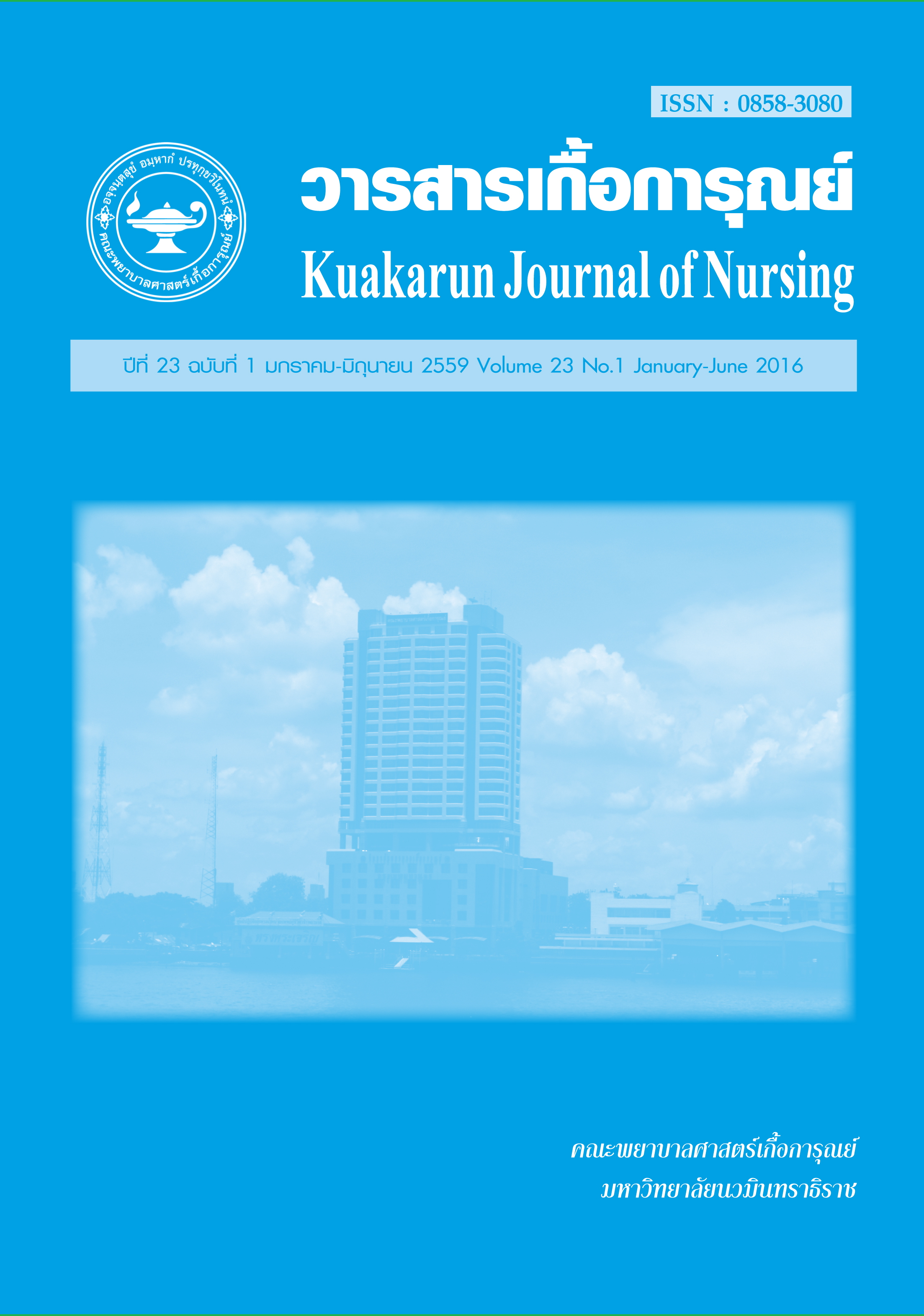ปัจจัยทำนายคุณภาพชีวิตในผู้ป่วยมะเร็งลำไส้ใหญ่และทวารหนัก ที่มีทวารเทียมและได้รับเคมีบำบัด Predicting Factors of Quality of life among Colorectal Cancer Patients with Colostomy Receiving Chemotherapy
คำสำคัญ:
คุณภาพชีวิต, ผู้ป่วยมะเร็งลำไส้ใหญ่และทวารหนัก, ทวารเทียม, เคมีบำบัดบทคัดย่อ
การวิจัยครั้งนี้มีวัตถุประสงค์เพื่อศึกษาคุณภาพชีวิตและอำนาจการทำนายคุณภาพชีวิตในผู้ป่วยมะเร็งลำไส้ใหญ่และทวารหนักที่มีทวารเทียมและได้รับเคมีบำบัด จากประสบการณ์การมีอาการ ความร่วมมือในการรักษาด้วยยาเคมีบำบัด และการสนับสนุนทางสังคม กลุ่มตัวอย่างคือผู้ป่วยผู้ป่วยมะเร็งลำไส้ใหญ่และทวารหนักที่มีทวารเทียมและได้รับเคมีบำบัดที่เข้ารับการรักษาในหน่วยเคมีบำบัด สถาบันมะเร็งแห่งชาติ โรงพยาบาลศิริราช โรงพยาบาลจุฬาลงกรณ์ คณะแพทยศาสตร์วชิรพยาบาล มหาวิทยาลัยนวมินทราธิราช จำนวน 110 คน เลือกกลุ่มตัวอย่าง โดยวิธีการสุ่มตัวอย่างตามสะดวก เครื่องมือที่ใช้ในการวิจัยคือ แบบสอบถามข้อมูลส่วนบุคคล แบบสอบถามคุณภาพชีวิต แบบสอบถามประสบการณ์การมีอาการ แบบสอบถามความร่วมมือ ในการรักษาด้วยยาเคมีบำบัด และแบบสอบถามการสนับสนุนทางสังคมที่ผ่านการตรวจสอบ ความตรงตามเนื้อหา โดยผู้ทรงคุณวุฒิและหาความเที่ยงจากแบบประเมินได้เท่ากับ .85, .97, .86 และ .93 ตามลำดับ วิเคราะห์ข้อมูลโดยการหาค่าเฉลี่ย ส่วนเบี่ยงเบนมาตรฐานค่าสัมประสิทธิ์ สหสัมพันธ์ของเพียร์สันและการวิเคราะห์ถดถอยพหุคูณแบบปกติ (Enter multiple regression analysis)
ผลการวิจัยพบว่า คุณภาพชีวิตโดยรวมของผู้ป่วยมะเร็งลำไส้ใหญ่และทวารหนักที่มีทวารเทียมและได้รับเคมีบำบัดอยู่ในระดับสูง (X= 79.60, SD=9.59) ประสบการณ์การมีอาการ ความร่วมมือในการรักษาด้วยาเคมีบำบัดและการสนับสนุนทางสังคมมีประสิทธิภาพในการทำนายคุณภาพชีวิตของกลุ่มตัวอย่างผู้ป่วยมะเร็งลำไส้ใหญ่และทวารหนักที่มีทวารเทียมและได้รับเคมีบำบัดได้ ร้อยละ 40 (R2 =.402) อย่างมีนัยสำคัญทางสถิติที่ระดับ .05
Predicting Factors of Quality of life among Colorectal Cancer Patients with Colostomy Receiving Chemotherapy
The purposes of this predictive correlational research were to study quality of life and to examine the predictability of predicting factors; symptoms experiences, adherence to chemotherapy and social support to the quality of life among colorectal cancer patients with colostomy receiving chemotherapy. One hundred and ten colorectal cancer patients with colostomy receiving chemotherapy were recruited from the chemotherapy unit of the National cancer institute, Siriraj Hospital, King Chulalongkorn Memorial Hospital and Faculty of Medicine Vajira Hospital University of Bangkok Metropolis by a convenience sampling strategy. The instruments used for data collection were the demographic data, the Quality of life index, the Memorial symptom assessment scale, the Adherence to chemotherapy and the Social support assessment scale. Content validity was examined by five experts and reliability was tested by using Cronbach’s alpha coefficient obtained at.85, .97, .86 and .93 respectively. Data were analyzed by using means, standard deviation, and Pearson’s product-moment correlation and enter multiple regression.
The results of the study revealed that colorectal cancer patients with colostomy receiving chemotherapy had high level of quality of life (X= 79.60, SD=9.59). Symptoms experience, adherence to chemotherapy and social support increase the explained variance in quality of life and variables accounted for 40% of total variance in quality of life. (R2 =.402, p < .05).

















